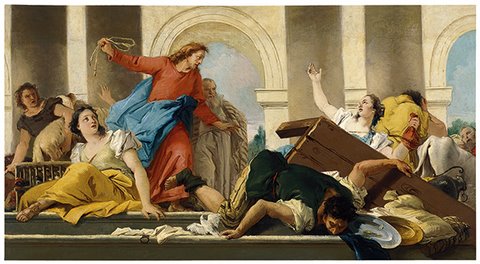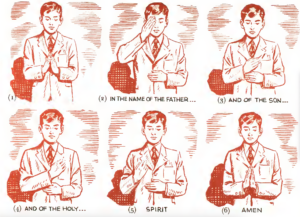
This is an interesting question. It would seem as if this would be the sin of simony. “Simony is defined as the buying or selling of spiritual things. To Simon the magician, who wanted to buy the spiritual power he saw at work in the apostles, St. Peter responded: “Your silver perish with you, because you thought you could obtain God’s gift with money!” Peter thus held to the words of Jesus: “You received without pay, give without pay.” It is impossible to appropriate to oneself spiritual goods and behave toward them as their owner or master, for they have their source in God. One can receive them only from him, without payment.” ¹. This creates a particular conundrum. For blessed items, the consensus seems to be that you can sell the blessed item for no more than the intrinsic value of the item itself.
The code of canon law is pretty clear when it states “It is absolutely forbidden to sell sacred relics.” ² This is because there’s a material difference between a blessed object and a relic. A blessed object were it not blessed still contains the value of its material. If a well-made wooden crucifix not blessed has value in its craftsmanship. A relic on the other hand belongs solely to the Christian body, retains value which would be immoral to gain from, and/or it has no inherent value. We can all agree the purchase of human organs is immoral and a shard of cloth removed from context holds no value.
That’s not to say it is immoral to own a relic that was given to you. Third class relics are typically ok. First and second class relics are bit iffier and have several regulations surrounding them. One such regulation is Canon 1190 §2 which states “Relics of great significance and other relics honored with great reverence by the people cannot be alienated validly in any manner or transferred permanently without the permission of the Apostolic See.” First class relics are a actual body part of the saint. Second class are objects they owned or frequently used. These would be relics of great significance. A third class relic only needs to be touched by a first or second class relic.
That being said there is no church documentation stating that a sold relic is any less holy than a purchased one and the Church doesn’t explicitly prohibit or allow the buying of relics. However, we can apply Catholic principles to this. We can say for sure that our purchase would enable and encourage the merchant to continue the sin of simony. Think about what a sin is for a second.
“Sin is an offense against reason, truth, and right conscience; it is failure in genuine love for God and neighbor caused by a perverse attachment to certain goods. It wounds the nature of man and injures human solidarity. It has been defined as “an utterance, a deed, or a desire contrary to the eternal law.” ³. We as Catholics can recognize that what the merchant is doing is a grave offense. We cannot give the message that what is being done is good.
Ecclesiastes tells us “For because the sentence is not speedily pronounced against the evil, the children of men commit evils without any fear.” ⁴. How do we punish evil in this case then? Think about what the merchant is looking to gain. Money. When we talk about stores and financial transactions we are talking about capitalistic concepts and in capitalism the consumers can vote. Not in the sense that you vote for a president or mayor but in the sense that you decide where your dollar goes.
If a merchant cannot retrieve enough currency from selling relics they will see it as unprofitable and are de-incentivized. What happens when not one buy ten and a hundred merchants are de-incentivized because we as customers have voiced our opinions using our wallet? The market is seen as unprofitable. Merchants will leave and new ones will not make the necessary investment because they understand we will not stand with it. In short, While buying relics in itself does not appear to be a sin you are indirectly promoting sin.
¹ CCC 2121
²Canon 1190
³CCC 1849
⁴Ecclesiastes 8:11

 First Sorrow: Mary Hears the prophecy of Simeon in the Temple
First Sorrow: Mary Hears the prophecy of Simeon in the Temple Second Sorrow: Mary flees with Joseph into Egypt to save Jesus
Second Sorrow: Mary flees with Joseph into Egypt to save Jesus Third Sorrow: Mary loses Jesus and finds Him again in the Temple
Third Sorrow: Mary loses Jesus and finds Him again in the Temple Fourth Sorrow: Mary meets Jesus carrying the cross on the way to Calvary
Fourth Sorrow: Mary meets Jesus carrying the cross on the way to Calvary Fifth Sorrow: Mary is present at the Crucifixion and Death of Jesus
Fifth Sorrow: Mary is present at the Crucifixion and Death of Jesus Sixth Sorrow: Mary receives the dead body of Jesus in her arms
Sixth Sorrow: Mary receives the dead body of Jesus in her arms Seventh Sorrow: Mary accompanies Jesus to His Burial
Seventh Sorrow: Mary accompanies Jesus to His Burial
Aaajili36, eh? Alright, tried it out of curiosity. Pretty standard stuff, but not bad. If you’re bored, give it a try. No promises though! Check it out: aaajili36
So far, im happy with 5hbet1. The selection of bets is good, and the process is easy enough to manage.
Feeling lucky tonight! Gonna try my hand at Luckywinbet. Wish me the best! I need a win! Check it out at luckywinbet
Heard some good things about 5jljl. So far, so good! The user interface is clean, and the game selection is pretty diverse. I’m giving it a thumbs up for now! Visit it today: 5jljl
Hubetapp, sounds convenient. Haven’t actually tried the app, but the website looks promising. Worth a download perhaps? hubetapp
Hey guys I’ve been checking out 88vinpro lately. Seems legit and they have some cool promotions. Definitely worth a look if you’re trying to find a new spot to play. Check them out here: 88vinpro
Feeling lucky anyone? Heard billionaire777vn is the place to be if you wanna roll with the big boys. Worth a shot to change your luck with them here: billionaire777vn